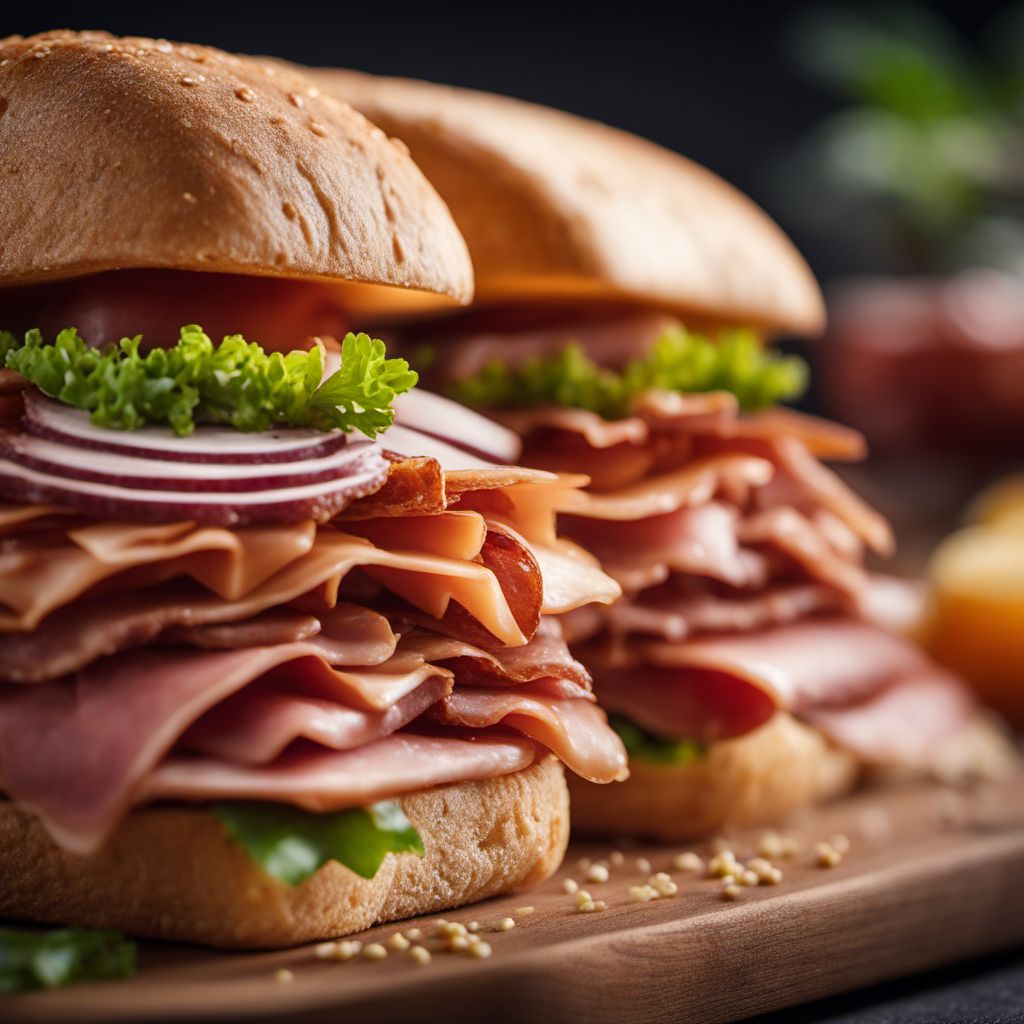
Ingredient
Sandwich with processed meat topping/filling
The Savory Delight: Exploring the World of Processed Meat Sandwiches
Processed meat toppings and fillings are typically made from cured and seasoned meats that have undergone various preservation methods, such as smoking, salting, or fermentation. These meats are often finely ground or sliced, resulting in a texture that is easy to spread or layer onto bread. With a wide range of flavors and textures available, from smoky and salty to tangy and spicy, processed meat toppings and fillings offer a versatile and convenient option for sandwich enthusiasts.
Origins and history
The use of processed meats in sandwiches can be traced back to ancient times when preservation techniques were developed to extend the shelf life of meats. In Europe, the tradition of curing and smoking meats dates back centuries, with regional specialties like Italian salami, German bratwurst, and Spanish chorizo becoming popular choices for sandwich fillings. In the United States, the invention of sliced deli meats in the late 19th century revolutionized the sandwich-making process, making it more accessible and convenient for people on the go.
Nutritional information
Processed meat toppings and fillings are a good source of protein, vitamins, and minerals. However, they are often high in sodium and saturated fats, so moderation is key when incorporating them into a balanced diet.
Allergens
Processed meat toppings and fillings may contain allergens such as soy, wheat, and dairy, depending on the specific ingredients used in the processing and seasoning.
How to select
When selecting processed meat toppings or fillings, look for products that are made from high-quality meats and have minimal additives or preservatives. Opt for options that are labeled as nitrate-free or low-sodium if you are concerned about these additives. Additionally, choose products that are stored and displayed properly in the store, ensuring freshness and quality.
Storage recommendations
Processed meat toppings and fillings should be stored in the refrigerator at temperatures below 40°F (4°C) to prevent bacterial growth. Once opened, they should be consumed within a few days or according to the manufacturer's instructions.
How to produce
While producing processed meat toppings and fillings is a complex process that requires specialized equipment and knowledge, amateur cooks can experiment with making their own cured and smoked meats at home. However, it is important to follow proper food safety guidelines and recipes from trusted sources to ensure the safety and quality of the final product.
Preparation tips
Processed meat toppings and fillings can be enjoyed in a variety of ways. They can be spread onto bread or rolls to create classic sandwiches, layered in wraps or tortillas for a portable meal, or even used as a topping for pizzas or salads. To enhance the flavor, consider pairing them with complementary ingredients such as cheese, pickles, mustard, or mayonnaise. Experiment with different bread types, condiments, and vegetables to create your own unique sandwich creations.
Culinary uses
Processed meat toppings and fillings are commonly used in sandwiches of various types, including deli sandwiches, subs, hoagies, and paninis. They are also popular in wraps, baguettes, and bánh mì sandwiches. Additionally, they can be incorporated into appetizers, such as sliders or stuffed mushrooms, for a flavorful twist.
Availability
Processed meat toppings and fillings are widely available in grocery stores, supermarkets, and delis worldwide.
More ingredients from this category

Sandwich with meat and vegetable topping/filling
The Ultimate Stacked Delight: Meat and Veggie Sandwich

Sandwich with cheese, egg and vegetable topping/filling
Elevate Your Lunch: A Gourmet Sandwich Delight

Sandwich with fish topping/filling
Ocean Delight Sandwich

Hamburger with bread
"The Classic American Delight: Juicy Hamburger on a Soft Bun"

Sandwich with cheese and vegetable topping/filling
"Garden Delight: A Scrumptious Sandwich with Cheesy Veggie Goodness"

Sandwich with cheese topping/filling
"Melting Delights: Elevate Your Sandwiches with Irresistible Cheese Toppings and Fillings"

Hot dog with bread
The Classic Comfort

Steak sandwich
Savory Delight: The Perfect Steak Sandwich

Sandwich with vegetable topping/filling
Vibrant and Wholesome: Vegetable-Topped Sandwiches

Doner kebab
The Savory Delight: Unraveling the Secrets of Doner Kebab

Sandwich with fish and vegetable topping/filling
Oceanic Delight: A Wholesome Fish and Veggie Sandwich